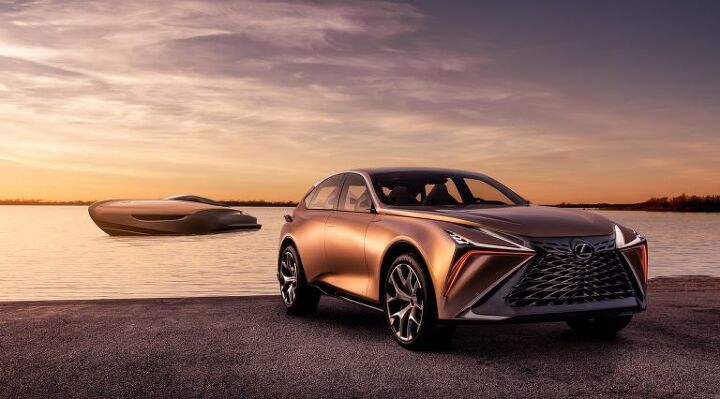Ahoy: Lexus Now Focusing on Premium Boat Business

Lexus sales slipped in the United States over the last two years. While overall deliveries remain relatively strong, the Japanese luxury brand saw its annual volume surpassed by Mercedes-Benz in 2013. BMW followed suit in 2017 and the gap only looks to be widening this year. So, what does a high-end nameplate do to lure back customers?
The answer is an obvious one: it starts building boats. It might shock you to learn this, but boats have actually been around since prehistoric times and physical examples have been discovered that are at least 10,000 years old. Meanwhile, most cars aren’t even 100 years old. Basic math proves boats to be the more sustainable product and a sounder investment. Cars had a good run, but autonomous vehicles and ride-sharing services are about to convert driving into a passive and homogeneous experience in a totally hypothetical and undetermined amount of time. Boats will be where it’s at very soon and every automaker will eventually become a sloop manufacturer.
Alright, I’ll stop being a prick (for now). What Lexus is really attempting to do is gussy up its image, endearing itself to the growing legions of super-rich people by providing contemporary yachts — something Mercedes-Benz has done in the past.
The fancy boat market is minuscule and the profit margin isn’t nearly large enough to trump car building at any meaningful volume. Lexus, no doubt, already knows this. But the automaker saw an opportunity to remake itself as a premium lifestyle brand by designing the Lexus Sport Yacht concept — honored by Japan’s “Boat of the Year” committee at the country’s International Boat Show in Yokohama last week.
Now, it has expressed its intent to build a bigger version of the watercraft and put it on sale by 2019. “Based on our amazing experiences in engineering, building, testing and showing the Lexus Sport Yacht concept last year, we’ve decided to take the next bold step of producing an all-new larger yacht that builds on the advanced nature of the concept while adding more comfort and living space,” said Shigeki Tomoyama, executive vice president of Toyota, in a statement. “We plan to start sales in the U.S. in the latter half of 2019, with sales in Japan following in the spring of 2020.”
Planned as a larger 65-foot sport fly-bridge cruiser, the new yacht will have luxury staterooms below deck and entertaining space for up to 15 guests. The boat will also make use of Toyota’s new Mobility Services Platform to provide internet connectivity, security, smart phone integration, and diagnostics.
While we’d like to see Lexus continue its focus on making sport utility vehicles customers can’t say no to (and amping up the performance of some of its sportier models) — without sacrificing that legendary dependability — the boat impulse isn’t a terrible one. Toyota already has marine division and luxury brands seem to sell better the more they distance themselves from the mainstream. As mainstream cars grow in quality, luxury brands have been forced to place a serious emphasis on cutting-edge tech or adding desirability through careful branding.
“Improving the quality of the cars themselves is important, but we also need to present car owners with a dream-like vision of the luxury lifestyle,” Tomoyama explained. “A yacht is a very effective part of that.”
We’re wondering if it will pay off in the long run. Plenty of Lexus shoppers won’t care if the brand is attached to seafaring luxury or not. But if the automaker can tap into more enviable lifestyle accoutrements, there’s a chance people will begin associating the brand with wealth. That could help move everything from the $36,000 NX crossover to the $92,000 LC coupe.
[Images: Toyota Motor Corp.]

A staunch consumer advocate tracking industry trends and regulation. Before joining TTAC, Matt spent a decade working for marketing and research firms based in NYC. Clients included several of the world’s largest automakers, global tire brands, and aftermarket part suppliers. Dissatisfied with the corporate world and resentful of having to wear suits everyday, he pivoted to writing about cars. Since then, that man has become an ardent supporter of the right-to-repair movement, been interviewed on the auto industry by national radio broadcasts, driven more rental cars than anyone ever should, participated in amateur rallying events, and received the requisite minimum training as sanctioned by the SCCA. Handy with a wrench, Matt grew up surrounded by Detroit auto workers and managed to get a pizza delivery job before he was legally eligible. He later found himself driving box trucks through Manhattan, guaranteeing future sympathy for actual truckers. He continues to conduct research pertaining to the automotive sector as an independent contractor and has since moved back to his native Michigan, closer to where the cars are born. A contrarian, Matt claims to prefer understeer — stating that front and all-wheel drive vehicles cater best to his driving style.
More by Matt Posky
Latest Car Reviews
Read moreLatest Product Reviews
Read moreRecent Comments
- Jeffrey Henry Ford said about innovation, “ If I had asked my customers what they wanted, then they would have said a faster horse." Change is inevitable!!!https://www.wri.org/insights/countries-adopting-electric-vehicles-fastest#:~:text=Currently%2C%2016%20countries%2C%20including%20Canada,create%20and%20enforce%20such%20policies.
- ToolGuy If these guys opened a hotel outside Cincinnati I would go there to sleep, and to dream.
- ToolGuy Michelin's price increases mean that my relationship with them as a customer is not sustainable. 🙁
- Kwik_Shift_Pro4X I wonder if Fiat would pull off old world Italian charm full of well intentioned stereotypes.
- Chelsea I actually used to work for this guy




































Comments
Join the conversation
LMAO
The Black Panther cross promotion will be the end of them. Goodbye long-time repeat buyers.